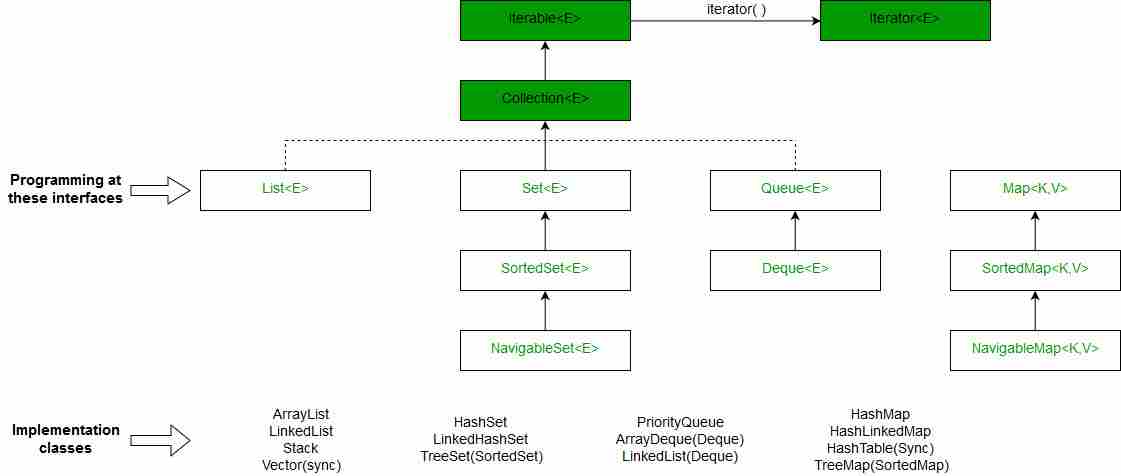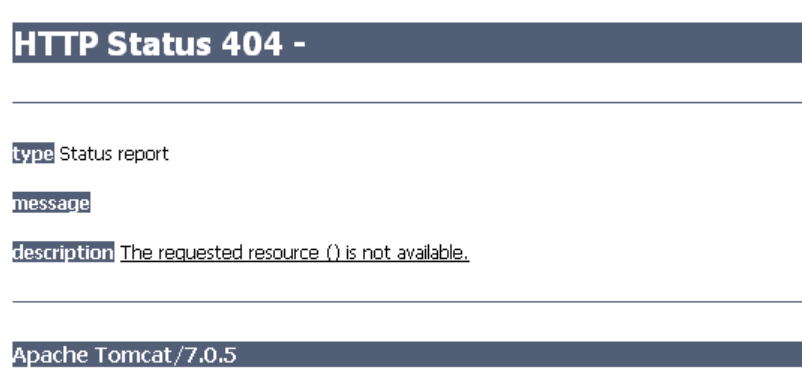HashMap和TreeMap是 收集框架 .
null
HashMap<K, V> hmap = new HashMap<K, V>();
让我们考虑下面的例子,在这里我们必须计算给定整数数组中每个整数的出现。
Input: arr[] = {10, 3, 5, 10, 3, 5, 10};
Output: Frequency of 10 is 3
Frequency of 3 is 2
Frequency of 5 is 2
/* Java program to print frequencies of all elements using HashMap */ import java.util.*; class Main { // This function prints frequencies of all elements static void printFreq( int arr[]) { // Creates an empty HashMap HashMap<Integer, Integer> hmap = new HashMap<Integer, Integer>(); // Traverse through the given array for ( int i = 0 ; i < arr.length; i++) { Integer c = hmap.get(arr[i]); // If this is first occurrence of element if (hmap.get(arr[i]) == null ) hmap.put(arr[i], 1 ); // If elements already exists in hash map else hmap.put(arr[i], ++c); } // Print result for (Map.Entry m:hmap.entrySet()) System.out.println( "Frequency of " + m.getKey() + " is " + m.getValue()); } // Driver method to test above method public static void main (String[] args) { int arr[] = { 10 , 34 , 5 , 10 , 3 , 5 , 10 }; printFreq(arr); } } |
输出:
Frequency of 34 is 1 Frequency of 3 is 1 Frequency of 5 is 2 Frequency of 10 is 3
要点
- HashMap既不基于键也不基于值来维护任何顺序,如果我们希望按排序顺序维护键,我们需要使用TreeMap。
- 复杂性 :get/put/containsKey()操作在一般情况下是O(1),但我们不能保证这一点,因为这完全取决于计算哈希需要多少时间。
申请: HashMap基本上是 散列 .因此,只要我们需要使用键值对进行哈希,我们就可以使用HashMap。例如,在Web应用程序中,用户名作为密钥存储,用户数据作为值存储在HashMap中,以便更快地检索与用户名对应的用户数据。
TreeMap<K, V> hmap = new TreeMap<K, V>();
下面是同样问题的基于树映射的实现。与之前的解决方案相比,该解决方案的时间复杂度为O(nLogn)。这种方法的优点是,我们以排序的顺序获取元素。
/* Java program to print frequencies of all elements using TreeMap */ import java.util.*; class Main { // This function prints frequencies of all elements static void printFreq( int arr[]) { // Creates an empty TreeMap TreeMap<Integer, Integer> tmap = new TreeMap<Integer, Integer>(); // Traverse through the given array for ( int i = 0 ; i < arr.length; i++) { Integer c = tmap.get(arr[i]); // If this is first occurrence of element if (tmap.get(arr[i]) == null ) tmap.put(arr[i], 1 ); // If elements already exists in hash map else tmap.put(arr[i], ++c); } // Print result for (Map.Entry m:tmap.entrySet()) System.out.println( "Frequency of " + m.getKey() + " is " + m.getValue()); } // Driver method to test above method public static void main (String[] args) { int arr[] = { 10 , 34 , 5 , 10 , 3 , 5 , 10 }; printFreq(arr); } } |
输出:
Frequency of 3 is 1 Frequency of 5 is 2 Frequency of 10 is 3 Frequency of 34 is 1
要点
- 对于像add、remove、containsKey这样的操作,时间复杂度是O(logn),其中n是树映射中存在的元素数。
- TreeMap始终保持元素的排序(递增)顺序,而HashMap中的元素没有顺序。TreeMap还为第一、最后、地板和天花板键提供了一些很酷的方法。
- HashMap实现Map接口,TreeMap实现SortedMap接口。排序后的地图界面是地图的子界面。
- HashMap实现了哈希,而TreeMap实现了红黑树(一种自平衡的二进制搜索树)。因此所有 哈希和平衡二叉搜索树的区别 在这里申请。
- HashMap和TreeMap都有对应的HashSet和TreeSet。HashSet和TreeSet实现 设置接口 .在HashSet和TreeSet中,我们只有键,没有值,它们主要用于查看集合中的存在/不存在。对于上述问题,我们不能使用HashSet(或TreeSet),因为我们不能存储计数。我们更喜欢HashSet(或TreeSet)而不是HashMap(或TreeMap)的一个示例问题是打印数组中所有不同的元素。

相关文章
参考资料: https://docs.oracle.com/javase/7/docs/api/java/util/Collection.html
本文由 希拉格·阿格拉瓦尔 .如果你喜欢GeekSforgek,并想贡献自己的力量,你也可以写一篇文章,然后将文章邮寄给评论-team@geeksforgeeks.org.看到你的文章出现在Geeksforgeks主页上,并帮助其他极客。
如果您发现任何不正确的地方,或者您想分享有关上述主题的更多信息,请写评论
© 版权声明
文章版权归作者所有,未经允许请勿转载。
THE END


![关于”PostgreSQL错误:关系[表]不存在“问题的原因和解决方案-yiteyi-C++库](https://www.yiteyi.com/wp-content/themes/zibll/img/thumbnail.svg)






